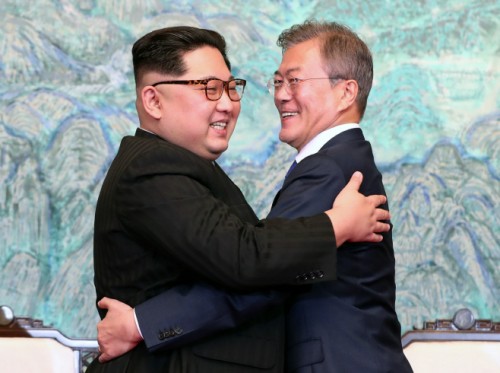 |
| President Moon Jae-in and North Korean leader Kim Jong-un are hugging after issuing a joint statement in the Peace House building at the southern side of the truce village of Panmunjom, South Korea on April 27, 2018./ Source: Yonhap News |
By AsiaToday reporter Choi Tae-beom
The bloody Korean War has left decades of wounds on the Korean Peninsula. Sparked by the inter-Korean and North-U.S. summits however, the Korean Peninsula is facing a major turning point in the political situation this year that marks the 68th anniversary of the outbreak of the 1950-53 Korean War. Especially, the inter-Korean reconciliatory efforts are likely to ease military tensions further while accelerating economic cooperation.
The two Koreas have agreed to hold railway talks on Tuesday and road-related talks on Thursday for linking and modernizing cross-border railways and roads, according to the Ministry of Unification. They are also holding a meeting to discuss forestry cooperation on July 4.
Previously, the two Koreas had arranged such meetings during their high-level talks on June 1, where they discussed ways to implement follow-up measures of the Panmunjom Declaration made after the April 27 inter-Korean summit.
North and South Korea have been holding a series of talks this month to discuss ways to cooperate. On June 14, the two sides held general-level military to ease military tensions. On June 18, they held a meeting to discuss ways to expand sports exchanges. Then they held Red Cross talks on June 22 to discuss organizing a reunion of families separated by the Korean War and other humanitarian issues.
As a follow-up measure to the general-level talks, the two Koreas agreed Monday to restore inter-Korean military communication lines on the East Sea and West Sea area as soon as possible. On the same day, the Korean Red Cross began preparing for the upcoming reunion event of separated families by conducting a computer-based selection of candidates.
The upcoming railway, road-related, and forestry talks have great significance in expanding inter-Korean talks, which have been limited to military and humanitarian fields, to the economic sector.
It will be the first inter-Korean talks on economic cooperation apart from the Kaesong Industrial Complex project since the government implemented the May 24 measures against the North in the aftermath of the sinking of South Korea's Cheonan warship in 2010.
This seems to be part of the Moon Jae-in administration's "New Economic Map" initiative for linking the Korean Peninsula to the rest of Eurasia.
The main idea of the initiative is to strengthen economic cooperation between North and South Korea, and build an H-shaped economic structure through cooperation with neighboring countries. In order to do this, plans to modernize North Korea's railways and roads, and to link inter-Korean transportation network should be preceded.
Forestry cooperation is one of the sectors that North Korea needs the most. The South Korean government has launched a task force for a forestation project in North Korea.
The current cooperative mood on the Korean Peninsula is expected to continue smoothly, keeping pace with improvements in North Korea-U.S. relations.
However, it will be hard to promote full-fledged economic cooperation between the two Koreas under international sanctions imposed on North Korea. In the upcoming talks, the two Koreas are likely to confirm their will of cooperation rather than developing concrete plans.
"Through the sessions on railway, road and forestry cooperation, we will faithfully discuss ways to implement the Panmunjom Declaration with a view to lay the groundwork for the sustainable development of South-North relations and the establishment of lasting peace on the Korean Peninsula," the unification ministry said.
#Inter-Korean #talks #reconciliatory efforts #New Economic Map #Moon Jae-in
Copyright by Asiatoday
Most Read
-
1
-
2
-
3
-
4
-
5
-
6
-
7





















